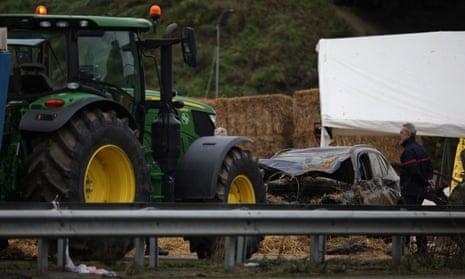The incident occurred at a mass protest of French farmers early Tuesday morning, leaving one woman dead and her husband and daughter injured.
In a French barrier, in the south-western Ariège region, a car carrying three foreigners ploughed through a wall of straw and crashed into a family of livestock farmers from the village of Saint-Felix-de-Tournegat, local authorities said. The woman died instantly. Her husband and teenage daughter are in critical condition, the Ariège prefecture said. Prime Minister Gabriel Attal noted:
“The nation is in shock and expresses its solidarity.”
The prosecutor’s office in the town of Foix, near the crash site, said three people in the car had been taken into custody as part of a manslaughter investigation, but “the facts do not support a version of an intentional act”.
The incident has heightened tensions in the standoff between the government and farmers angry at a proposal to remove tax breaks on diesel used in tractors, which is usually delivered to farms in large tankers. The proposal to raise diesel prices for cars sparked the Yellow Vests protest movement in 2018, which led to violent clashes in Paris and brought traffic to a standstill in wide parts of France. Cédric Baron, a farmer manning a barrier near Carbonne, south of Toulouse, told Le Monde, a daily newspaper:
“We are going to stay here as long as the government does not announce some strong measures, and, if necessary, we will go and block Paris.”
The new government led by Gabriel Attal, the 34-year-old prime minister, faced its first crisis when barricades spread along motorways in the south-west of the country. Jordan Bardella, the president of the anti-immigrant National Rally party, said during a visit to the Bordeaux region on Saturday:
“This is the France of the forgotten. The fight for agriculture is also the fight against rural effacement, the cry of a French people who do not want to die.”
Farmers are outraged at the proliferation of what they see as stifling “regulations” imposed by the EU and the French government. These rules have become so all-encompassing that, in the words of Emmanuelle Ducros, writing in the daily newspaper L’Opinion, “being a farmer in France is like reading Kafka on a tractor”.
The rules are so pervasive that almost none of the more than 66 million acres of farmland in France are affected. They concern pesticides, fertilisers, bird protection, wetland conservation, the obligation to leave 4% of land fallow, mandatory replanting of fields after harvest – all this and more is governed by an increasingly complex zoning system that means farms are divided into segments with different rules.
Farmers believe that many of these rules reflect the environmental obsession of “elite” city dwellers and civil servants at European Union headquarters in Brussels, as well as an ignorance of the practical difficulties faced by farm workers more concerned with how to live to the end of the month than the goal of creating a carbon-free economy.
Macron, in a social media post, called the incident a tragedy that “upsets us all” and said he had instructed his government to find “concrete solutions” to address the difficulties highlighted by farmers.
